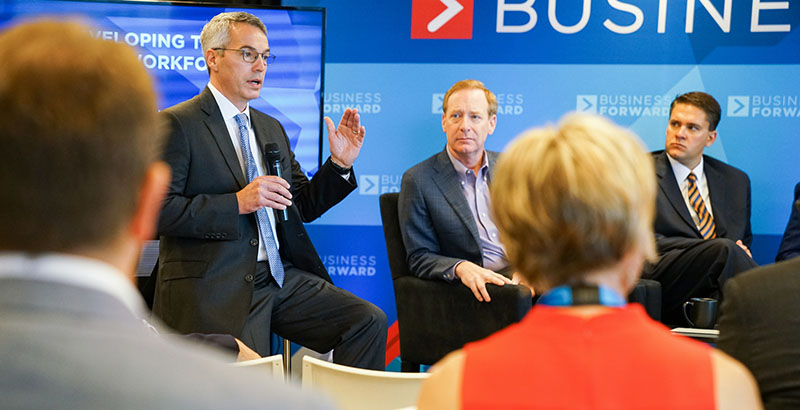Doyle: What Corporate Leaders Mean When They Say That America’s Schools Should Run Like Businesses — and Why That’s a Good Idea

Jim Doyle is president of Business Forward, a national business group that works with more than 100,000 business leaders across America. Today The 74 published the results of a national Business Forward survey that shows a majority of business leaders saying that American schools are “on the wrong track,” and 1 in 4 fearing that poorly performing schools could threaten their industries. (Read the full results)
Like most people, business leaders trust teachers and principals — and they hate bureaucrats. They support giving teachers more control over their classrooms and principals more control over their budgets. Most support increasing school funding. Those who do are more likely to focus on helping poor schools than the ones their own kids attend.
During education briefings, business leaders and officials often disagree over what it means to run schools like a business. Here’s what business leaders mean — and why it’s a good idea.
First, when a business leader talks about running a school like a business, she typically has a services company in mind — not a factory. When you think of a school as a service provider, you treat students as customers, and customers always come first. Younger executives, operating in a world of internet conferencing, Google Docs, and 360 reviews, know where schools should be heading. Compare this student-as-customer approach to today’s schools, which operate on what could be called a schools-as-factories approach. Students are outputs or products. The school board, mayor, and state legislature are the real customers. In today’s model, bureaucracy comes first; students come second.
Second, business leaders feel a powerful obligation to hire local graduates. The problem? Most high school graduates lack the technical skills, life skills, and work ethic employers need. For fast-growing cities like Denver, Atlanta, New Orleans, and San Antonio, hiring local is particularly hard. Business leaders in Denver, led by Colorado Succeeds and other local business groups, are examining their state’s talent pipeline, with ambitious plans to fill the leaks. If they succeed, the payoff for students and the state is enormous. By increasing its high school graduation rate for poor students to 93 percent from 75 percent — now matching the nation’s best schools — Colorado could help those students earn $5 billion in additional income over 10 years. The state’s GDP could grow by $7 billion.
Third, business leaders understand the importance of the systems that make schools successful. Buses (school or municipal) and single-application websites are expensive to operate, but you can’t have real school choice without them. Similarly, giving teachers autonomy works only if we hold them accountable for results. Business leaders are prepared to give teachers and principals more control, but they will also be around for the accountability part.
Fourth, business leaders understand that cities compete with one another for new business and investment — and good schools are a big competitive advantage. Want to grab the attention of a Charlotte CEO? Tell her about the new partnerships CEOs in Atlanta are creating with Atlanta Public Schools Superintendent Meria Carstarphen. Trying to make a point about charters in Cleveland? Talk about Indianapolis test scores. With a competitor’s case study in hand, business leaders are powerful advocates.
For nine years, I’ve run a trade group that helps local business leaders speak out on education reform, climate change, immigration, free trade, health care, budget deficits, tax reform, and a dozen other issues. We’ve prepared leaders to testify before federal agencies, lead briefings at the White House, publish op-eds, lobby city halls and Congress, debate on cable news, and appear in hundreds of local papers. These are all things that leaders we work with have been outspoken about.
On education, we’ve helped business leaders brief the secretary of education, the secretary of labor, two deputy secretaries, and hundreds of other officials about career and technical training, promising education technologies, school choice, and charters.
A final thing about business leaders: They understand the importance of diversity and inclusion in schools because they manage diversity and inclusion in their offices every day. Americans are segregating ourselves by where we live, where we pray, the news we watch, and where we go online. But we all have to work. Chances are, your office is the most diverse part of your day. CEOs who’ve turned diversity into a competitive advantage should be sharing that experience with all of us, particularly our kids.
Jim Doyle is president of Business Forward, a national business group that works with more than 100,000 business leaders across America.
Also now live at The 74, about the new Business Forward survey: 1 in 4 business leaders say poorly performing schools are threatening their industries, and 10 key quotes from surveyed business leaders about the state of America’s schools.
Disclosure: Walton Family Foundation provides support to Business Forward and The 74.
Get stories like these delivered straight to your inbox. Sign up for The 74 Newsletter

;)